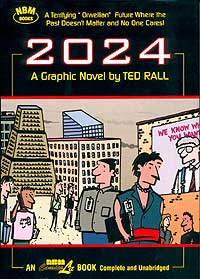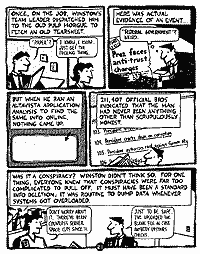
|
Rall's Winston Smith lives in Canamexicusa, which exists in perpetual trade-war with either the "Euros" or the Asians. Meanwhile Smith spends his days in an "upper-middle management" job and either trading shares, buying consumable goods over the ubiquitous web-tv, or watching porn. Mirroring the events of "1984," the "2024" Winston takes an interest in illegal, bootlegged, old-school videogames like "Pong," and has an affair with a woman who's upper-upper management. Eventually he gets caught and subjected to "Channel 101," an educational program about rats, which so severely strains Smith's entertainment requirements that he breaks.
Rall, a political cartoonist who occasionally contributes to the print arm of this Website, has a clunky, chunky drawing style which gains in uniqueness what it loses in verisimilitude. Almost cubist, the flat, black and white images include characters that always stand with their body facing you but their face in profile, except for the eyes, which sit on one side together. Mostly the images are in service to the text, which tends to bear down on them, overwhelming them. Rall likes words.

|
But by paralleling the magnum opus of George Orwell, one of the 20th century's masters of clear, precise English prose, Rall sets himself up for a fall. Unlike Orwell, he lacks the clarity of ideas and language to make a convincing, or even understandable gestalt. The confusion of "2024" permeates everything from overall themes to simple panel-to-panel tone inconsistencies. For example one panel reads, "These extremists threatened everything ... they had to be killed," followed immediately by "Fortunately, nobody took them seriously..." Believe me, the pictures don't makes this any more understandable.
While awkward transitions make for difficult reading (a kind of language violation that Orwell politicized in "1984") the bizarre thematic violations make the book feel false and even hypocritical. One of Rall's consistent objects of parody, the use of irony as a disaffecting, unempathic "attitude," is embodied in the "2024" catchphrase, "Yes. No. Whatever." Yet Rall's entire book reads like an exercise in ironic detachment. He even uses it for gags, as when Winston rebelliously listens to the two-hit 1980s group Quiet Riot. We never care about the characters because Rall doesn't want us to. If anything, the diseffected cynicalness of "Yes. No. Whatever," sums up the whole book's attitude. How ironic.
You can enjoy some of the ideas of "2024." Rall is smart and intuitive in a vicious sort of way. His running gag of business minutiae as the new entertainment feels dead on. Likewise it's funny when Winston reacts to Channel 101 being "the worst thing in the world," with that meaningless, fully-corpratized hipster catchphrase, "That's cool." But the book lacks the central values of human decency which made it matter that Winston Smith of "1984" came to scrawl "2+2=5" into the dust of his cafe table.
Perhaps these inconstancies are part of the book's Art — an attempt to discombobulate the audience with extreme contradictions just as the characters live in a state of perpetual untruth and obfuscation. But I doubt Rall thought about it that much. Or if he did, he failed, because "2024," unlike its inspiration, never gives you the feeling of being in the grips of a narrative master and certainly never makes you think more than a second about your own life.
"2024" can be found at better comicbook stores, and will be available in regular bookstores in July.
